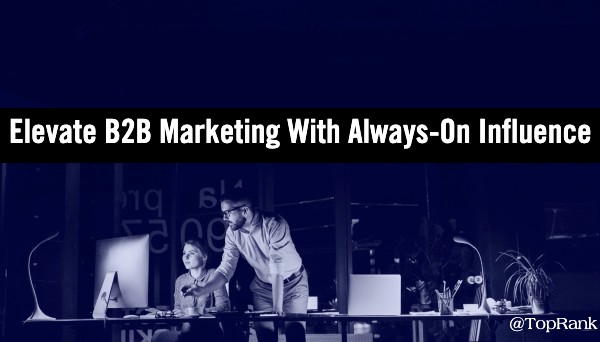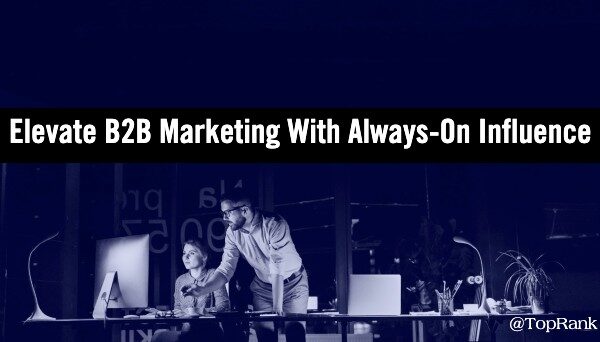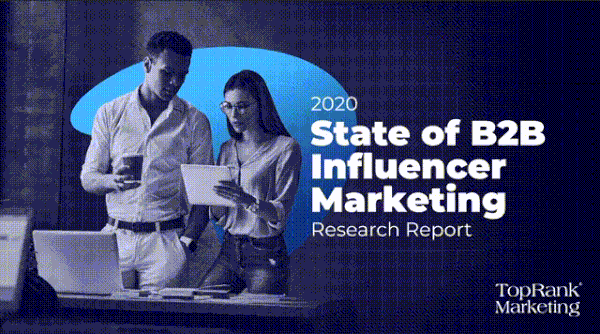
While 96% of B2B marketers we surveyed in or State of B2B Influencer Marketing Report are confident about influencer marketing, the majority are still approaching influencer engagement on a periodic or campaign basis vs. Always-On. That short term approach is costly:
12X more B2B marketers are very successful by running Always-On influencer programs vs. those engaged in intermittent campaigns.
With all the challenges brought by the pandemic and uncertainty in the world, an increasing number of B2B marketers are working with influencers on an ongoing basis to create more trusted content with credible distribution and authentic engagement.
But it’s important to understand that there’s nothing wrong with running influencer campaigns. When a message, available experts and readiness of an audience all align with the right approach, you can see influencer content campaign outcomes like:
Cherwell Software – Generated 22% of their annual sales pipeline from an influencer marketing pilot focusing on 15 tech leaders sharing their insights on next generation IT service management.
Alcatel Lucent – Facilitated $2 million in sales pipeline from a first of it’s kind pilot campaign for the company featuring influencer judges and an effort to impart influence amongst IT network and enterprise communications prospects being awarded for their contributions to the industry.
But these examples are exceptions and not the norm.
That said, when properly planned and executed as a strategy vs. an afterthought tactic, influencer collaborations can drive success for B2B marketing programs. The problem is, only working and engaging influencers when you need them for campaigns doesn’t build momentum. And in 2021, B2B brands need momentum more than ever to take and keep the lead in an oversaturated digital marketplace of information.
Always-On thought leadership and influence are more important now than ever because the customer never turns off.

Brain Solis, Digital Anthropologist, Futurist at Salesforce
An Always-On approach to working with influencers builds the relationships needed in order to activate the most credible voices that have the attention and trust of your customers for brand message ideation, communication, promotion, engagement and advocacy. Some of the ways successful B2B marketers are engaging influencers on an ongoing basis include:
- Social nurturing
- Repurposing influencer content
- Micro-activations
- 1-1 and 1-small group engagement
- Building an influencer community
- Activating organic advocacy
What these successful B2B marketers understand is that influencer engagement isn’t only about a transactional value exchange for compensation, access or exposure. Always-On influence is about building a relationship between the brand and industry experts around a common purpose with shared values.
The benefit of an Always-On approach creates value for your customers by making content more relevant, trustworthy, and actionable. Optimizing B2B brand content with the third party credibility of relevant influencers can create substantial lift for brand and content marketing as we found in our research:
- 75% Increased views of brand content
- 70% Improved credibility of brand content
- 60% Increased share of voice
- 55% Increased media mentions of brand
- 50% Increased brand advocacy
There are myriad other benefits not covered in our research from facilitating thought leadership to having credible voices at the ready during a crisis.
Building a Community of B2B Influence at LinkedIn
By taking a strategic approach to influencer engagement through building relationships, LinkedIn has been able to grow a 75 strong sales and marketing community of the top voices in the industry. Of course this community didn’t happen overnight. LinkedIn is a beloved brand with many self-proclaimed influencers seeking partnerships but not everyone is qualified to be a voice for the LinkedIn brand.
The first step LinkedIn took was the development of an influencer marketing strategy and a relationship focused approach towards identifying, qualifying and engaging with those sales and marketing voices that align with LinkedIn values, content creation expectations, audience topic preferences and authenticity. LinkedIn effectively worked to nurture and build relationships with prospective influencers before inviting them to take part in content activations.
These B2B influencer activations were designed to accentuate the best capabilities, message and audience of the respective influencers within the context of LinkedIn’s messaging strategy. Activations took several forms including:
- Social First Influencer Content on LinkedIn
- Influencer Interviews
- eBook Contributions
- In-Person Event to Co-Create Content (pre-COVID)
- Conference Mixers (pre-COVID)
- Ongoing Social Nurturing
The impact of having a community of vetted industry experts excited about collaborating with the LinkedIn brand meant over 2,000 brand mentions by influencers and their networks and over 84 million in social reach during the initial phase of activations. Working with influencers in this way boosted social engagement by 200-450% above previous social efforts by LinkedIn on its own platform. See the full LinkedIn influencer marketing case study here.
An Always-On approach means the relationship ceases to be “transactional”. Because of this foundation, we’ve been able to immediately activate influencers for external, public-facing advocacy and amplification.

Garnor Morantes, Group Marketing Manager at LinkedIn
As with many growing B2B marketing disciplines, it’s the competency of being able to create and execute the right approach and tactics that can be the difference between breakout success and mediocrity. You can see even more examples of Always-On B2B influence in action here.
However, not every B2B brand needs to dive into an Always-On approach right away. It’s perfectly fine to conduct a pilot or even a few campaigns before embarking on an Always-On approach. But how can B2B marketers evolve from a pilot to an Always-On influencer program?
How to Elevate B2B Marketing with Always-On Influence
Luckily, I will be presenting on this very topic at this week’s B2B Marketing Exchange Experience. A virtual B2B marketing conference happening Feb 22 – 24.
B2BMX includes 6 tracks and over 50 sessions with expert B2B marketers from top B2B brands including Dun & Bradstreet, Microsoft, Tealium, Demandbase, Salesforce, Forrester, Fujitsu, McAfee, SurveyMonkey, Cisco, Oracle, Okta, BMC Software, Honeywell, SAP Concur, Terminus, ON24, and many more.
I’m also happy to see some of the biggest names in B2B marketing speaking including Ardath Albee, Jay Baer, Ruth Stevens, Jon Miller, Matt Heinz, Mark Bornstein, Rob Leavitt, Pam Didner and others.
My presentation is part of the Marketing Strategy track, Pilot To Program: How To Elevate B2B Influence To Always-On on Wednesday Feb 24th at 1:45. Here’s what to expect:
Based on recent research, 12X more B2B marketers are very successful with always-on influencer marketing programs compared to those running periodic campaigns.
B2B influence is a relationship business and authentic advocacy can bring big returns. But how can marketers gain the confidence to evolve from testing to ongoing influencer marketing programs?
This session from B2B influencer marketing expert Lee Odden of TopRank Marketing could be the catalyst that helps you:
- Match the right benefits of Always-On influence with your marketing goals;
- Hit the ground running with early wins influencer engagement; and
- Create a crawl, walk, run influencer marketing program plan.
Of course, if you haven’t checked out our research into Always-On B2B influence, you can access and download the report here.
And if you have seen the report and are interested in learning more about how to launch an influencer marketing pilot or elevate your influencer marketing program to Always-On, our team at TopRank Marketing are ready to help.




